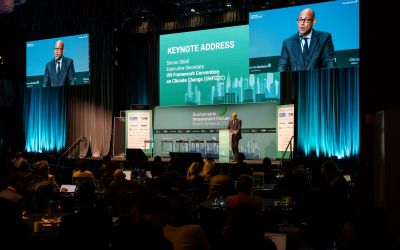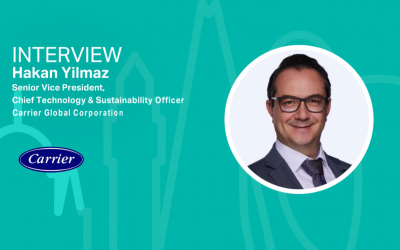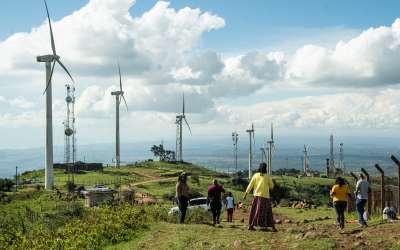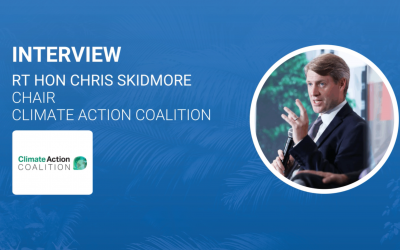The Game has Changed for Good
As the Paris Agreement enters into force, Patricia Espinosa, Executive Secretary, UN Framework Convention on Climate Change (UNFCCC) reinforces that climate action is at the heart of global development and highlights the priorities that are central to its success.
The Paris Climate Change Agreement changed everything. The international effort to bring it into force in under a year carries the clear message that we must now be swift in the execution.
Climate action – faster and smarter, bigger and better – is now at the heart of humanity’s essential response to the existential threats that climate change and environmental decay present for sustainable development, peace and the well-being of all people.
In 2015, the countries of the world constructed a fresh, integrated vision which aims to set all societies and economies on the path to a low-carbon, resilient future. This vision, captured in the Paris Agreement, the 2030 Agenda for Sustainable Development and Sendai Framework for Disaster Risk Reduction, reflects a unique unity of purpose to shift completely the way we produce, consume and build onto a clean, efficient and durable model.
These momentous agreements now require unprecedented scale and depth of universal action involving all actors at all levels in all regions of the world. The challenges will be enormous. The rewards of success will be greater.
The timetable is pressing, a fact which the UN climate change COP22 conference in Marrakech must have at the front of its concerns. In a short time, by the normal reckoning of human history, we need to see unprecedented reductions in greenhouse gas emissions and unequalled efforts to build societies that can resist rising climate impacts.
There are two absolute priorities. First is a much faster, fundamental shift in flows and incentives of investment away from unsustainable power generation, infrastructure, pollution and waste.
Second, the leadership and commitment of all governments remains central to success.
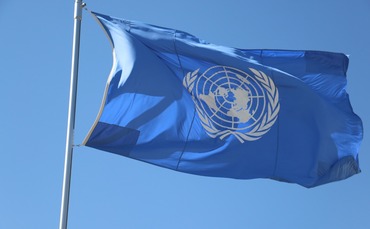
Paris to Marrakech – entry into force
Climate action contributes directly to the goal of greater human well-being captured in the 17 Sustainable Development Goals. It protects lives and livelihoods, improves public health, creates new industries and sustainable farming, cuts costs for governments, business and citizens and opens up new avenues of clean industry and stable investment.
The Paris Agreement’s primary goal – to limit global warming to well below 2°C and as close to 1.5°C as possible to prevent dangerous tipping points in the climate system – means that global emissions must peak soon and be driven down drastically thereafter. A balance must be achieved in the second half of this century between global emissions and removals through sequestration into ecosystems or through other means.
That is why the annual UN climate change conference in Marrakech represents a new departure for the international community.
COP22 opens only days after the Paris Agreement enters into force and the first meeting of the Agreement’s governing body, known as the CMA, will take place during the conference. This is a moment to celebrate – but more importantly a moment to commit to the new agenda of rapid and robust implementation and action that the goals of the Agreement demand, not least in pressing forward with adequate support to help the most vulnerable countries take climate action.
Marrakech gives governments the opportunity to present a roadmap to mobilise the pledged 100 billion dollars in annual support by 2020, to increase clarity for adaptation finance and for a mechanism to strengthen capacity building, which assists developing countries to build up the skills and institutional strengths to take greater climate action.
We will see initiatives that support the implementation of Nationally Determined Contributions – national climate plans – and help integrate them into each country’s development agenda alongside the Sustainable Development Goals also adopted in 2015.
Marrakech is also the opportunity to strengthen the partnerships that accelerate the transition towards a low-emissions future and promote the sustainable development goals which governments have committed to meet.
National policy critical to rapid progress
Climate-friendly national policies are central to the successful delivery of the Paris goals. This is especially so because the Agreement’s success rests on full implementation of the global set of national climate plans. This requires continued political leadership and momentum, supported by a clearly presented and growing public understanding of the enormous social, health and economic benefits that will accrue to citizens everywhere from strong, escalating climate action.
Key to the transformation will be the way governments integrate climate action and implement sustainable development and risk management goals across sectors and ministries.
More climate-friendly, coordinated laws, policies and incentives are needed. All forms of unequal treatment favouring old growth and development models based on fossil fuels and high-carbon lifestyles and aspirations must be removed as quickly as possible.
In addition to environmental policy, energy, industry, fiscal, trade, transport and farm policies should all work in a concerted, coherent manner to enable every country to accomplish their Paris Agreement and Sustainable Development Goal contributions.
Finance, finance, finance
Undoubtedly, a much faster flow of finance for climate action is required, if the world is to meet the ambitious goals of these agreements.
UN estimates show that achieving sustainable development will need US$5-7 trillion a year, a large slice of which must fund the essential transition to a low carbon, resilient global economy. Governments, multilateral and private sector institutions need to be able and willing to raise and allocate tens of billions of dollars at a time towards climate and sustainable investments.
Meanwhile, smaller-scale funding must be available to allow the individual investor, smaller companies and poorer countries without easy access to big money to take a full and willing part in this economic transformation.
The shift is already under way from across the public and private sector, including governments, multilateral development banks, dedicated funds like the Green Climate Fund, companies and private sector financial institutions. Innovative financial instruments are being issued in record amounts – Green Bonds and Climate Bonds – and new ones for new challenges are being considered, for example Catastrophe Bonds.
Only this month, the UN launched the Financial Innovation Platform to bring together all key public and private financial actors to identify and pilot innovative finance instruments.
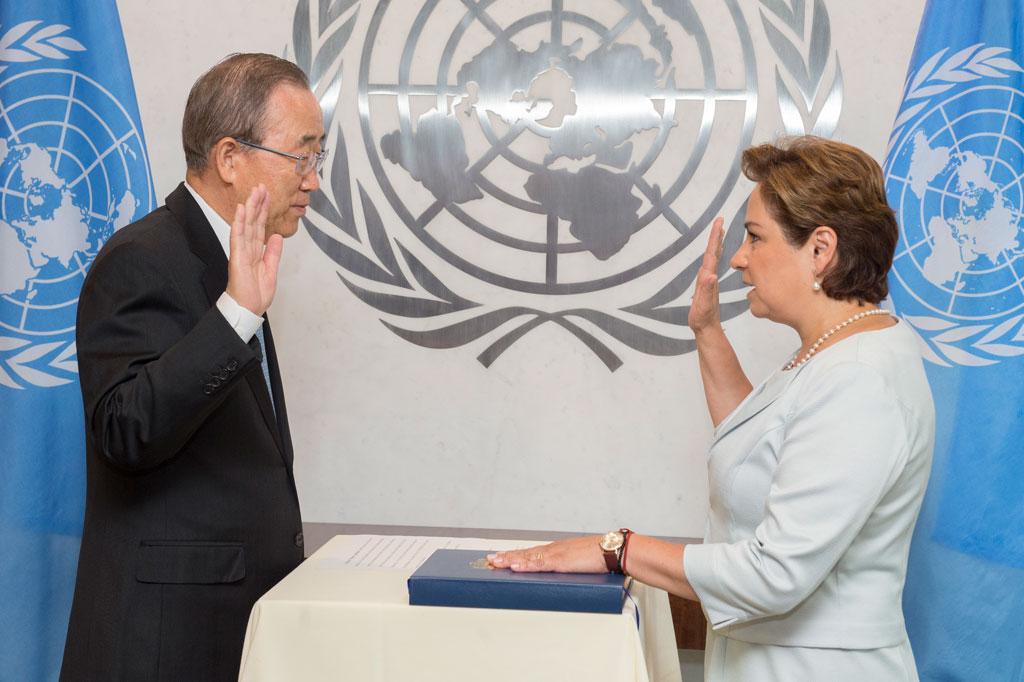 The past year has seen new, major commitments. For example, the Green Climate Fund has over US$10 billion pledged from governments. All the multilateral development banks will allocate many billions of dollars more over the next few years for climate action – which will leverage many times more that amount of private sector funding. A suite of financial instruments and channels is therefore being created to ensure that the wide range of climate needs can be addressed across the globe and to mobilise larger-scale flows.
The past year has seen new, major commitments. For example, the Green Climate Fund has over US$10 billion pledged from governments. All the multilateral development banks will allocate many billions of dollars more over the next few years for climate action – which will leverage many times more that amount of private sector funding. A suite of financial instruments and channels is therefore being created to ensure that the wide range of climate needs can be addressed across the globe and to mobilise larger-scale flows.
The only sector with the money, resources and reach to support governments in full implementation of climate action is the private sector. The great breakthrough before and beyond Paris is that business and investment are increasingly convinced that their own profitable future is inextricably linked to low-carbon, sustainable development and universal human well-being.
Increasing private sector appetite to fund the transformation directly is essential. Tens of trillions of dollars sit in banks and on corporate balance sheets at low, zero, even negative, interest rates looking for bankable projects with real returns if the right incentives and sureties are provided by national governments, supported by the international community and its multilateral lenders.
Paris, Marrakech and beyond – the game changed for good
The game has changed for good. Let us remind ourselves why that is so.
In Paris, governments publicly accepted responsibility to lead climate action. They presented a global set of national plans to take immediate action, pledging never to lower efforts over time and, whenever possible, to raise ambition.
They agreed to complete the details of a transparent global regime, a rulebook which will account for, review and underpin greater action by all sides. Governments are keen to complete this – and the early entry into force makes it important that this is done by 2018 at the latest to sustain the required momentum.
And governments agreed not only to complete but also to strengthen adequate technology and financial support to developing nations.
To reach its full potential, governments will now engineer the ambitious design of the Paris Agreement into a well-oiled machine of these fully functioning working parts capable of accelerating climate action to meet the agreement’s stated aims and goals.
Achieving the aims and ambitions of the Paris Agreement is not a given. The world needs to understand the urgency and complexity of what the international community has embarked upon. This is a multi-decadal effort to turn around two centuries of development based on fossil fuels and the excessive exploitation of finite natural resources into an all-embracing, sustainable path for every nation, man, woman and child.
But I am confident that world leaders and the enormous groundswell of support from cities, companies, investors and citizens can propel ambition further and faster in support of our shared vision of a climate-secure and sustainable future.
Read the full Climate Action 2016/17 Publication here




